Donald Trump asks GOP chair Ronna McDaniel to serve a second term

President Donald Trump has asked Republican National Committee Chairwoman Ronna McDaniel to serve a second term. That’s according to a person familiar with the president’s decision. The decision comes as the president looks to build out his team for his re-election campaign. As head of the RNC, McDaniel leads the party’s fundraising and voter mobilization efforts. McDaniel has accepted Trump’s offer. The RNC will hold an official vote in January. The person familiar with Trump’s decision was not authorized to discuss the matter publicly. Axios first reported that the president had asked McDaniel to stay on. Republished with permission from the Associated Press.
RNC: Spending on legal bills for Donald Trump Jr. nears $200K
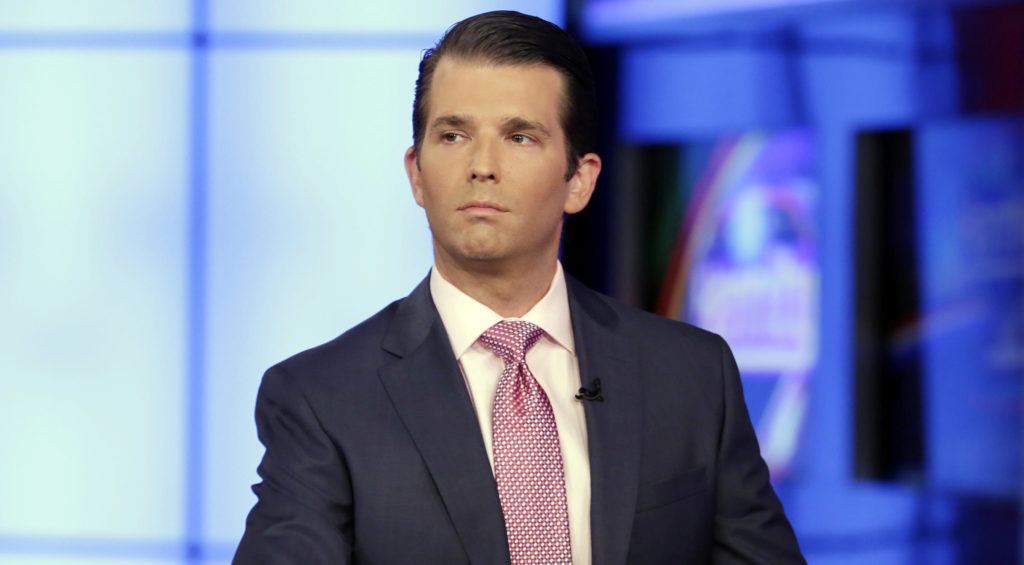
The Republican National Committee has paid nearly $200,000 in legal fees for President Donald Trump‘s eldest son in connection with the Russia investigation, a committee official said Tuesday. More than $166,000 was paid to Donald Trump Jr.’s attorney, Alan Futerfas. Another $30,000 went to the law firm of Williams & Jenson, which helped prepare him for testimony. The RNC official insisted on anonymity to discuss financial information not yet made public. The RNC is expected to release its August spending totals Wednesday, but that report will not include the spending on Trump Jr.’s legal fees. Those figures will appear on the committee’s September report, the official said. Trump Jr.’s attorneys’ fees were paid for out of the “legal proceedings account,” a pre-existing account that high-dollar donors to the party knowingly contribute to. The payments were not taken from the party’s general fund and will not reduce party spending on political work, the official said. Trump Jr. recently testified in private to Senate investigators that he did not collude with Russia to damage Hillary Clinton‘s campaign against his father. Congressional investigators and Justice Department special counsel Robert Mueller want to learn more about a June 2016 meeting Trump Jr. had at Trump Tower in New York with a Russian lawyer as part of their separate but broader inquiries into links between the Trump campaign and Russia. U.S. intelligence agencies have said Russia tried to influence the election to help Trump win. Trump’s son-in-law, Jared Kushner, now a senior adviser to the president, also attended the June 2016 meeting. As of mid-July, Trump’s presidential campaign had spent almost $1 million on legal fees this year, according to a campaign finance report filed with the Federal Election Commission. That included a $50,000 charge for Futerfas’ law firm. The payment was made shortly before news reports about the younger Trump’s Russia meeting. Republished with permission from the Associated Press.
Donald Trump’s fundraising prowess keeps Republican Party close

Republican senators are bucking President Donald Trump’s calls to revive the health care debate. And Trump just ousted his only top White House aide with deep links to the Republican Party. But the president and his party won’t be calling it quits anytime soon. They remain tightly linked by a force more powerful than politics or personal ties: cash. Trump’s fundraising prowess is the engine of the Republican National Committee and a lifeline for every Republican planning to rely on the party for financial help during next year’s congressional races. Leaning heavily on Trump’s appeal among small donors, the party has raised $75 million in the first six months of the year, more than double what the Democratic National Committee had raised by the same point in President Barack Obama’s first year. “The president is somebody who absolutely is an asset when it comes to fundraising,” RNC chairwoman Ronna Romney McDaniel said. Trump resonates with a base of Republicans who have been more willing this year than ever before to chip in. The party says it collected more cash online in the first six months of the year than in all of 2016. In late June, Trump played star and host of a fundraiser for his re-election campaign and the RNC. The event at the Trump International Hotel, just down Pennsylvania Avenue from the White House, raised $10 million to be divided between Trump and the party, the kind of bounty usually reserved for the final months before an election. The fundraising numbers help explain why more Republicans — particularly those facing re-election next year — aren’t openly distancing themselves from a president whose approval rating hovers below 40 percent and whose White House has been wracked by public back-biting and legislative stumbles. And while Trump hasn’t hesitated to call out Republicans who defy him, he’s largely come to appreciate the permanence the RNC offers a White House that has had to quickly staff up from nothing — a task that hasn’t always gone smoothly. Trump’s dismissal last week of chief of staff Reince Priebus prompted a rush of concern from Republican lawmakers who’d gotten to know Priebus during his nearly six years as party chairman. Some wondered if Trump was losing his only link to the Republican Party. Yet the well-funded RNC has been reformatted for the Trump era. “The president likes the fact that the party is structured to help his agenda, and there’s not a question that this RNC is 100 percent loyal to him,” said Brian Ballard, one of the party’s lead fundraisers. “It’s not like the RNC he inherited as the party’s nominee; it’s his now.” Party employees have led communication at key points of the investigations into whether the Trump campaign had anything to do with Russian interference in the presidential election. And the RNC, realizing how important television is to this particular White House, has added employees to help book Trump proponents on cable shows. There are awkward GOP moments, to be sure. Just this week, Arizona Republican Sen. Jeff Flake, in his new book, called out Trump for his “seeming affection for strongmen and authoritarians.” Trump over the weekend on Twitter ridiculed Senate Republicans for not passing a health care bill, saying Democrats were laughing at them and they “look like fools.” McDaniel said the president has “every right” to engage with Republicans however he sees fit. “The American people put him in office to accomplish his agenda,” she said. She’s backed him up on Twitter: “I run into people every day who are hurting across the country under Obamacare,” she wrote recently. “Giving up is not an option.” Priebus and others at the RNC were squeamish about their presidential nominee at various points during the 2016 campaign, but few if any detractors remain at its headquarters on Capitol Hill, where the hallways are lined with portraits of Trump and blown-up snapshots of him. The RNC voted McDaniel in as party chair on Trump’s recommendation. As the Michigan GOP head, she’d been a staunch Trump supporter even as her uncle, 2012 Republican presidential nominee Mitt Romney, expressed his own reservations about Trump during the campaign. Trump also tapped Bob Paduchik, his campaign’s Ohio director, to serve as a deputy to McDaniel. The two remain close, and Paduchik traveled with Trump last month for a rally in Youngstown. Trump’s family, including son Donald Trump Jr. and daughter-in-law Lara Trump, Eric Trump’s wife, are involved in the RNC’s strategy and fundraising and have grown close to McDaniel. Longtime Trump friend Steve Wynn, a fellow billionaire businessman, is the party’s chief fundraiser; the president’s personal lawyer, Michael Cohen, is among the RNC’s principal fundraisers. His campaign’s trusted data and digital director, Brad Parscale, joined the board of Data Trust, the party’s data vendor, which keeps its voter files up to date. Trump heaped praise on the RNC’s leadership team during the June fundraiser, calling them stars and winners. Bill Stepien, the White House’s political director, said relations between the party and the president are as good now as they were in the mid-2000s, when he worked at the RNC while George W. Bush was president. Stepien said the White House and the party have “a strong relationship” and that Trump’s aides view the RNC as an “essential component” of his success. Republished with permission of The Associated Press.
After delay, RNC finally gives OK to funding for Alabama special election
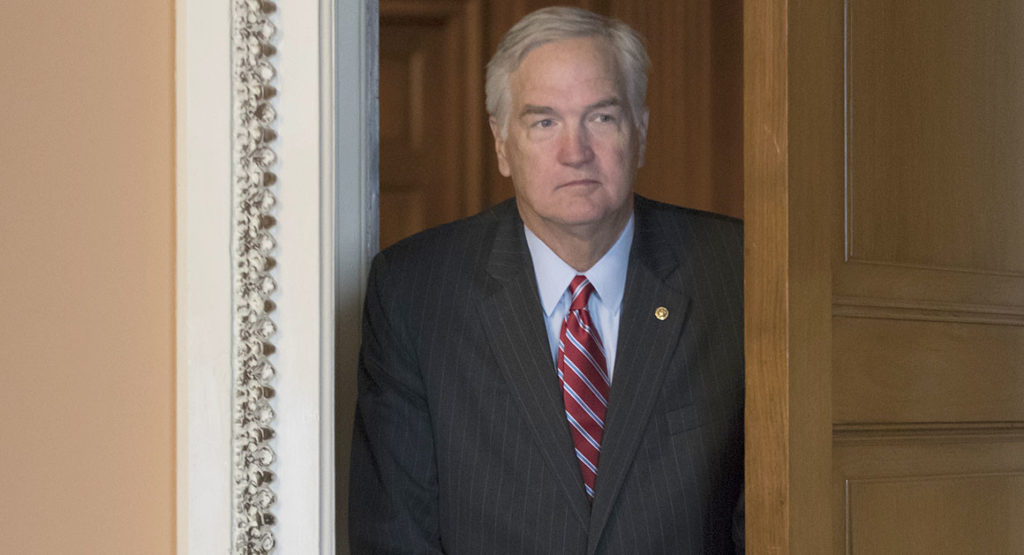
The Republican National Committee has approved funding for the Alabama special election, likely to support incumbent U.S. Sen. Luther Strange. As reported by POLITICO’s Alex Isenstadt, the long-delayed has recently become “a point of contention between Senate Republicans and the White House,” over Attorney General Jeff Sessions’ old seat. Much of the problem seems to rest with the convoluted campaign finance rules which Isenstadt describes as “weeks of closed-door talks, inflamed tensions between Senate GOP leaders and the administration and touched on a central issue: how the insurgent-minded Trump White House will approach party primaries.” The approval allows the National Republican Senatorial Committee to spend more than $350,000 on the race to benefit Strange, facing a crowded 10-person field for the Aug. 15 Republican primary, which includes U.S. Rep. Mo Brooks and former Alabama Supreme Court Chief Justice Roy Moore. A primary runoff, if necessary, will be Sept. 26; the general election is Dec. 12. Among those backing Strange are Senate Majority Leader Mitch McConnell, through two McConnell-aligned groups — the NRSC and Senate Leadership Fund. For the past few weeks, McConnell has lobbied to get RNC to approve the cash infusion, but foot dragging so frustrated the majority leader that he appealed directly to former RNC chair and current White House chief of staff Reince Priebus. Strange also talked personally with President Donald Trump. Isenstadt writes that some close to McConnell thought the holdup could be due to bureaucratic disorganization — or the administration was intentionally staying out of the primary, giving a glimpse into how the White House might handle future political battles.
James Comey: Donald Trump administration spread ‘lies, plain and simple’

Former FBI Director James Comey accused the Trump administration Thursday of spreading “lies, plain and simple” about him and the FBI in the aftermath of his abrupt firing, in dramatic testimony that threatened to undermine Donald Trump’s presidency. As he opened his much anticipated first public telling of his relationship with Trump, Comey disputed the Trump administration’s justification for his firing last month, declaring that the administration “defamed him and more importantly the FBI” by claiming the bureau was in disorder under his leadership. And in testimony that exposed deep distrust between the president and the veteran lawman, Comey described intense discomfort about their one-on-one conversations, saying he decided he immediately needed to document the discussions in memos. “I was honestly concerned that he might lie about the nature of our meeting, so I thought it really important to document,” Comey said. “I knew there might come a day when I might need a record of what happened not only to defend myself but to protect the FBI.” Comey made his comments as the packed hearing got underway, bringing Washington and parts of the country to a halt as all eyes were glued on televisions showing the hearing. He immediately dove into the heart of the fraught political controversy around his firing and whether Trump interfered in the bureau’s Russia investigation, as he elaborated on written testimony delivered Wednesday. In that testimony he had already disclosed that Trump demanded his “loyalty” and directly pushed him to “lift the cloud” of investigation by declaring publicly the president was not the target of the FBI probe into his campaign’s Russia ties. Comey also said in his written testimony that Trump, in a strange private encounter near the grandfather clock in the Oval Office, pushed him to end his investigation into former National Security Adviser Michael Flynn. The Senate intelligence committee chairman, Richard Burr of North Carolina, asked Comey the key question about that encounter: “Do you sense that the president was trying to obstruct justice, or just seek a way for Mike Flynn to save face, given he had already been fired?” “I don’t think it’s for me to say whether the conversation I had with the president was an effort to obstruct,” Comey replied. “I took it as a very disturbing thing, very concerning. But that’s a conclusion I’m sure the special counsel will work towards to try and understand what the intention was there and whether that’s an offense.” Later, in a startling disclosure, Comey revealed that after his firing he had tried to spur the appointment of a special counsel by giving one of his memos about Trump to a friend of his to leak to the press. “My judgment was I need to get that out into the public square, ” Comey said. The Republican National Committee and other White House allies worked feverishly to lessen any damage from the hearing, trying to undermine Comey’s credibility by issuing press releases and even ads pointing to a past instance where the FBI had had to clean up the director’s testimony to Congress. Republicans and Trump’s own lawyer seized on Comey’s confirmation, in his written testimony, of Trump’s claim that Comey had told him three times the president was not directly under investigation. Trump himself was expected to dispute Comey’s claims that the president demanded loyalty and asked the FBI director to drop the investigation into Flynn, according to a person close to the president’s legal team who demanded anonymity because of not being authorized to discuss legal strategy. The president has not yet publicly denied the specifics of Comey’s accounts but has broadly challenged his credibility, tweeting last month Comey “better hope there are no ‘tapes’” of the conversations. “Lordy, I hope there are tapes,” Comey remarked at one point, suggesting such evidence would back up his account over any claims from the president. But it was a Democrat, Sen. Dianne Feinstein of California, who asked the question that many Republicans have raised in the weeks since Comey’s firing as one media leak followed another revealing Comey’s claims about Trump’s inappropriate interactions with him. Raising the Oval Office meeting where Comey says Trump asked him to pull back the Flynn probe, Feinstein asked: “Why didn’t you stop and say, ‘Mr. President, this is wrong,’?” “That’s a great question,” Comey said. “Maybe if I were stronger I would have. I was so stunned by the conversation I just took it in.” Comey was also asked if he believed he was fired because of the bureau’s investigation into Russia’s meddling in the 2016 election as well as Russia’s ties with Trump’s campaign. Graphic details opening exchange between James Comey and Senator Richard Burr. “Yes,” Comey said. “Because I’ve seen the president say so.” The hearing unfolded amid intense political interest, and within a remarkable political context as Comey delivered damaging testimony about the president who fired him, a president who won election only after Comey damaged his opponent, Hillary Clinton, in the final days of the campaign. Clinton has blamed Comey’s Oct. 28 announcement that he was re-opening the email investigation for her defeat. She’s argued she was on track to a victory when Comey’s move raised fresh doubts about her. “If the election were on Oct. 27, I would be your president,” Clinton said last month. Many Democrats blame Comey for Clinton’s loss, leading Trump to apparently believe they would applaud him for firing Comey last month. The opposite was the case as the firing created an enormous political firestorm that has stalled Trump’s legislative agenda on Capitol Hill and taken over Washington. Under questioning Thursday, Comey strongly asserted the intelligence community’s conclusion that Russia did indeed meddle in the 2016 election. “There should be no fuzz on this. The Russians interfered,” Comey stated firmly. “That happened. It’s about as unfake as you can possibly get.” Trump has begrudgingly accepted the U.S. intelligence assessment that Russia interfered with the election. But he has also suggested he doesn’t believe it,
Former FBI director James Comey says White House ‘defamed’ him and FBI
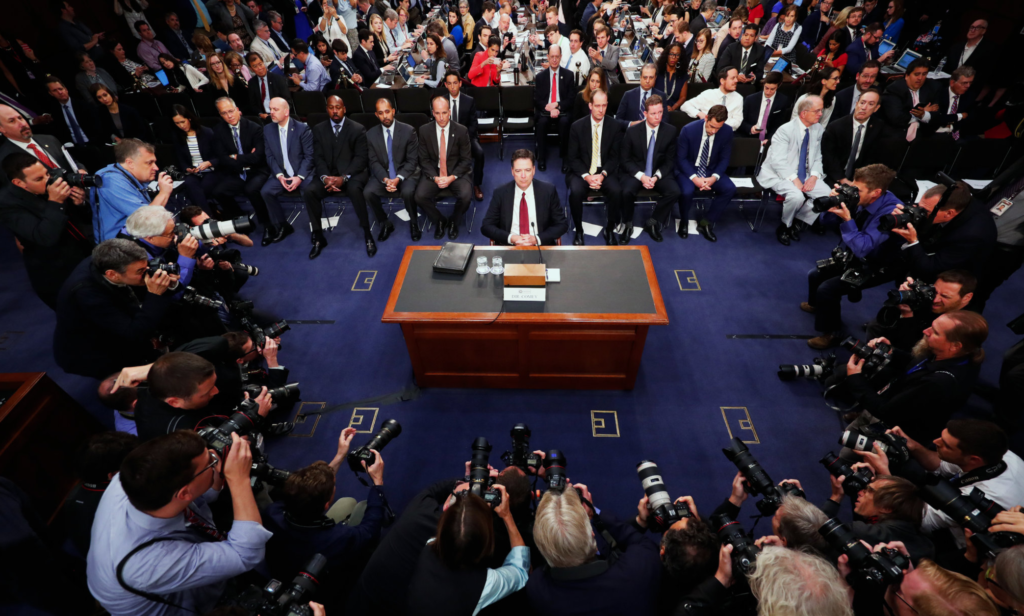
Former FBI Director James Comey accused the Trump administration Thursday of spreading “lies, plain and simple” about him and the FBI in the aftermath of his abrupt firing, in dramatic testimony that exposed deep distrust between the president and the veteran lawman and threatened to undermine Donald Trump’s presidency. Comey disputed the Trump administration’s justification for his firing, declaring the administration “defamed him and more importantly the FBI,” as he opened his much anticipated first public telling of his relationship with Trump. Comey described discomfort about their one-on-one conversations, saying he decided he immediately needed to document the discussions in memos. “I was honestly concerned that he might lie about the nature of our meeting, so I thought it really important to document,” Comey said. “I knew there might come a day when I might need a record of what happened not only to defend myself but to protect the FBI.” Comey made his comments as the packed hearing got underway, bringing Washington and parts of the country to a halt as all eyes were glued on televisions showing the hearing. He immediately dove into the heart of the fraught political controversy around his firing as he elaborated on written testimony delivered Wednesday. In that testimony he had already disclosed that Trump demanded his “loyalty” and directly pushed him to “lift the cloud” of investigation by declaring publicly the president was not the target of the FBI probe into his campaign’s Russia ties. Comey also testified in his written testimony that Trump, in a strange private encounter near the grandfather clock in the Oval Office, pushed him to end his investigation into former National Security Adviser Michael Flynn. Comey also confirmed Trump’s claim that he had told him three times the president was not directly under investigation. The Republican National Committee worked to lessen any damage from the hearing, trying to undermine Comey’s credibility by pointing to a past instance where the FBI had had to clean up his testimony to Congress. And Trump himself was expected to dispute Comey’s claims that he demanded loyalty and asked the FBI director to drop the investigation into Flynn, according to a person close to the president’s legal team who demanded anonymity because of not being authorized to discuss legal strategy. Trump has not yet publicly denied the specifics of Comey’s accounts but has broadly challenged his credibility, tweeting last month Comey “better hope there are no ‘tapes’” of the conversations. But it was a Democrat, Sen. Dianne Feinstein of California, who asked the question that many Republicans have raised in the weeks since Comey’s firing as one media leak followed another revealing Comey’s claims about Trump’s inappropriate interactions with him. Alluding to the Oval Office meeting where Comey says Trump asked him to pull back the Flynn probe, Feinstein asked: “Why didn’t you stop and say, ‘Mr. President, this is wrong,’?” “That’s a great question,” Comey said. “Maybe if I were stronger I would have. I was so stunned by the conversation I just took it in.” Comey was also asked if he believed he was fired because of the bureau’s investigation into Russia’s meddling in the 2016 election as well as Russia’s ties with Trump’s campaign. “Yes,” Comey said. “Because I’ve seen the president say so.” Comey described his concerns that Trump was trying to create a “patronage” relationship with him at a dinner where Trump asked him if he wanted to keep his job. “The statue of justice has a blindfold on because you’re not supposed to be peeking out to see whether your patron is pleased or not with what you’re doing,” Comey said. Senate intelligence committee Chairman Richard Burr is leading the committee’s investigation into Russia’s role in the 2016 election, which is proceeding even as a special counsel recently appointed by the Justice Department also investigates. “We will establish the facts separate from rampant speculation and lay them out for the American people to make their own judgment,” Burr said. “Only then will we be able to move forward and put this issue to rest.” Republished with permission of The Associated Press.
AG Jeff Sessions clarifies testimony on Russian contacts
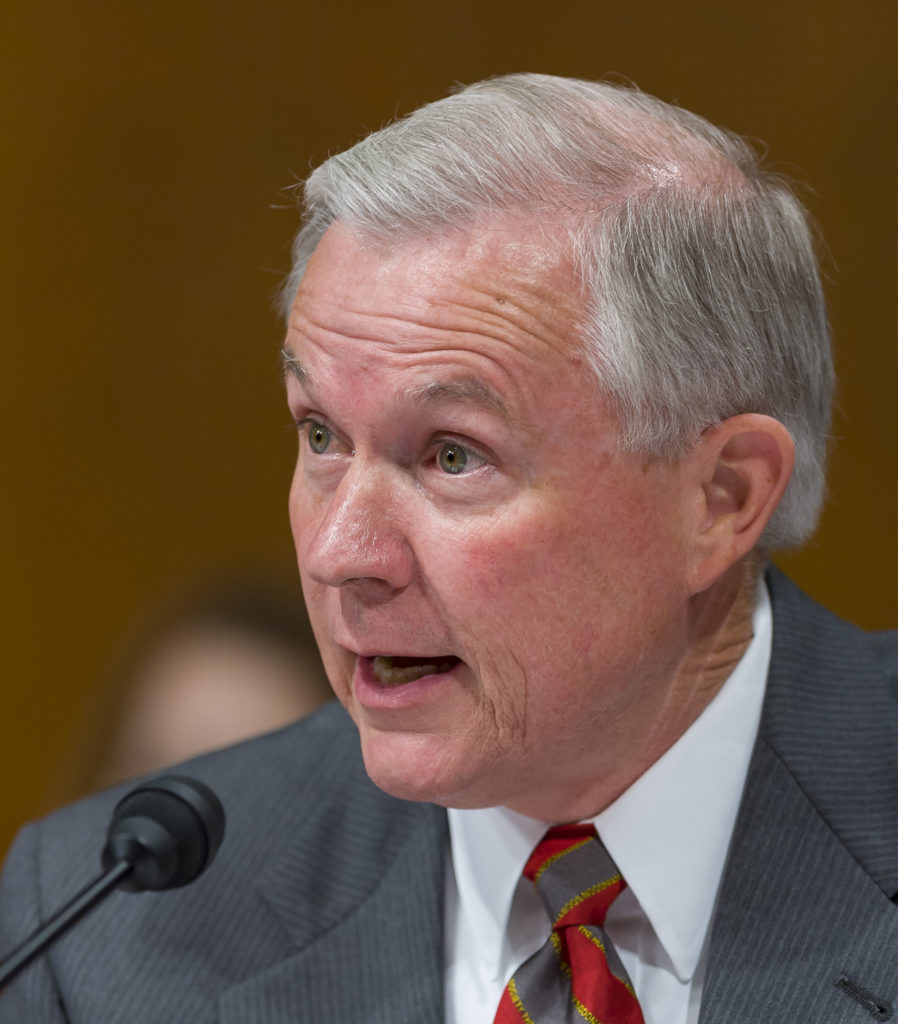
Attorney General Jeff Sessions has clarified his confirmation hearing testimony to acknowledge having spoken twice last year with the Russian ambassador. The filing Monday amends testimony Sessions gave in January when he said he did not have communications with the Russians. Sessions last week acknowledged that he had spoken with the ambassador once at the Republican National Convention last July and again at a meeting in his Senate office in September. He agreed to recuse himself from any investigations involving the Trump campaign and Russian interference in the presidential election. Sessions maintains in Monday’s filing that he had answered the question honestly. He says he didn’t mention communication with the ambassador because the question had not asked about it. Republished with permission of The Associated Press.
Donald Trump praises Michigan GOP while weighing RNC chairman call
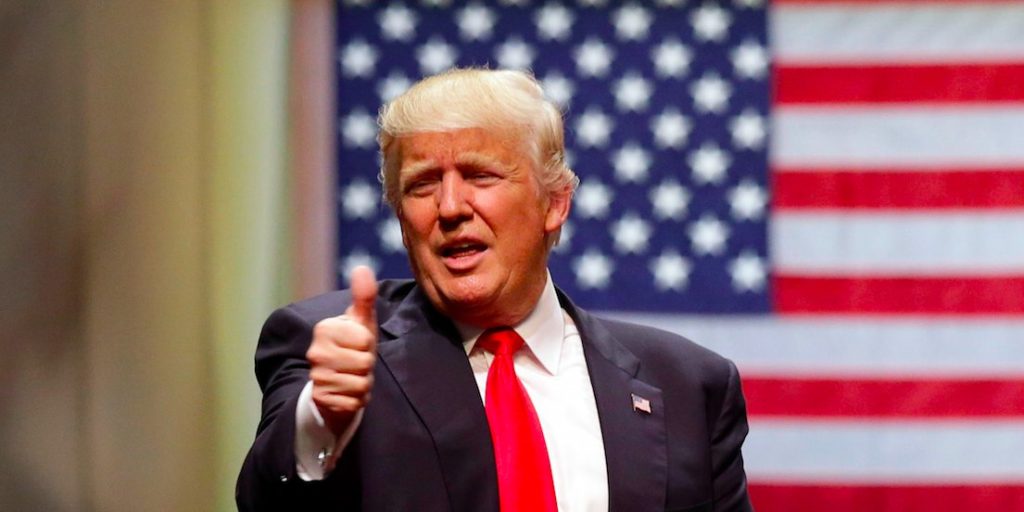
Donald Trump may have more than just his gratitude to offer in Michigan when he visits the state that capped his stunning presidential victory last month. Michigan Republican Party chairwoman Ronna Romney McDaniel is a leading contender for the Republican National Committee’s chairmanship. There was no immediate sign from Trump’s transition team Thursday that the billionaire planned to offer McDaniel the leadership post. The niece of 2012 GOP presidential nominee Mitt Romney is not the only contender. Rising national star Nick Ayers, a senior aide to Vice President-elect Mike Pence, also has vocal support from influential GOP figures. Whoever takes the post will face immediate pressure to hold onto control of Congress in 2018. Along with Trump’s public admiration, McDaniel has factors working in her favor, not the least of which is representing Republicans in a state that, until last month, was carried by Democrats in six consecutive presidential elections. McDaniel is scheduled to speak at a victory rally Trump plans to attend Friday in Grand Rapids. “Ronna’s record speaks for itself. The president-elect owes his success to the Rust Belt. Having a national party chair from here makes sense,” said Bob LaBrant, a Michigan GOP activist and former political director of the Michigan Chamber of Commerce. As Trump assembles his Cabinet, the party’s leadership is also his to recommend. Republican National Committee Chairman Reince Priebus, whom Trump has asked to serve as White House chief of staff, was a close adviser to Trump during the campaign. Priebus’ legacy – investing early in campaign staff and technology in key states – ahead of the 2018 midterms and 2020 presidential election is something an existing RNC member, as McDaniel is, would be inclined to follow, party insiders say. Priebus has been publicly silent on whom he’d like to succeed him. But Trump singled her out for praise during a packed New York City fundraiser Wednesday. Top supporters and donors gathered for a private thank-you session, whose attendees included McDaniel, Michigan Attorney General Bill Schuette and about 1,000 others. “The president-elect gave a big shout-out to Ronna” and said she had a “big opportunity,” Schuette recalled of Trump’s comments. Only a handful of individuals were mentioned by name, Schuette said. “I think that’s pretty significant.” Despite her uncle’s sharp criticism of Trump, the 43-year-old McDaniel fully endorsed the nominee who frustrated many in his party’s establishment. And still she’s widely admired across the RNC’s membership, several RNC members said. “I hold her in high regard,” Arizona committeeman Bruce Ash said. Other assets supporters cite: She is a quick study, has a solid fundraising reputation and has a strong Republican pedigree. Besides Uncle Mitt, the Michigan Romneys include her grandfather, the late former Gov. George Romney. After executing Michigan’s GOP election plan to victory, she next converted the state GOP into Trump’s recount legal team. She retained top lawyers who persuaded the state appeals court this week to deny Green Party candidate Jill Stein’s call for a recount. McDaniel did not requests for comment Thursday but told The Associated Press last month she’d be “interested in whatever Mr. Trump wants.” Some close to Trump are recommending Ayers, who has credentials that seem to defy his 34 years. Ayers was the Republican Governors Association executive director in 2010, a successful year for Republican state executives, and was a key adviser to Pence’s 2012 governor’s race. He joined Trump last summer, mainly helping Pence. He now advises Pence, who is chairman of the transition. “Trump allies are encouraging Nick to run,” Trump spokesman Jason Miller told The Associated Press this week. Ayers counts heavyweights former Mississippi Gov. Haley Barbour, a former RNC chairman, former Texas Gov. Rick Perry and incoming Missouri Gov.-elect Eric Greitens among his backers. “The fact is Nick wins,” said Greitens, whom Ayers advised during his 2016 campaign. “I am 100 percent behind Nick Ayers.” The showdown between Romney and Ayers has the makings of the first power struggle within Trump’s budding administration. Then again, the unpredictable Trump could always surprise. Others said to be interested: Matt Pinnell, RNC liaison to state parties; David Bossie, committeeman from Maryland; David Urban, Pennsylvania GOP operative. One name won’t be in contention. New Jersey Gov. Chris Christie, who had expressed interest, is no longer considering seeking the party chairmanship, Christie aides said Thursday. Republished with permission of The Associated Press.
RNC commemorates Rosa Parks and the Montgomery, Ala. bus boycott

Dec. 5 marks the 61st anniversary of the Montgomery, Ala. bus boycott, which began in the days following Rosa Parks‘ arrest after she refused to give up her bus seat to a white man, as was the custom for the time period in 1955. The boycott lasted 381 and garnering national attention and ultimately leading to the landmark 1956 U.S. Supreme Court ruling that outlawed segregation on public transportation. On Monday, the Republican National Committee (RNC) Co-Chair Sharon Day released a statement commemorating the anniversary of 1955-1956 boycott. “Rosa Parks’ courage on a Montgomery, Alabama bus in December 1955 helped fuel one of the great demonstrations for freedom and equality in our nation’s history,” Day wrote. “Her stand for human dignity and equality lit the spark of conscience in citizens across Montgomery, leading to a bus boycott which dealt a blow to injustice and drew national attention to the burgeoning civil rights movement. By refusing to take the bus, freedom-minded people across that city made a 381-day declaration that liberty was of infinitely greater importance than any convenience in getting where they had to go. Today we commemorate the Montgomery bus boycott, a bold act of conviction which helped put segregation to death and moved America one step closer to completely honoring the Declaration of Independence’s truism that “all men are created equal.”
Donald Trump victory brings ‘alt-right’ into full view
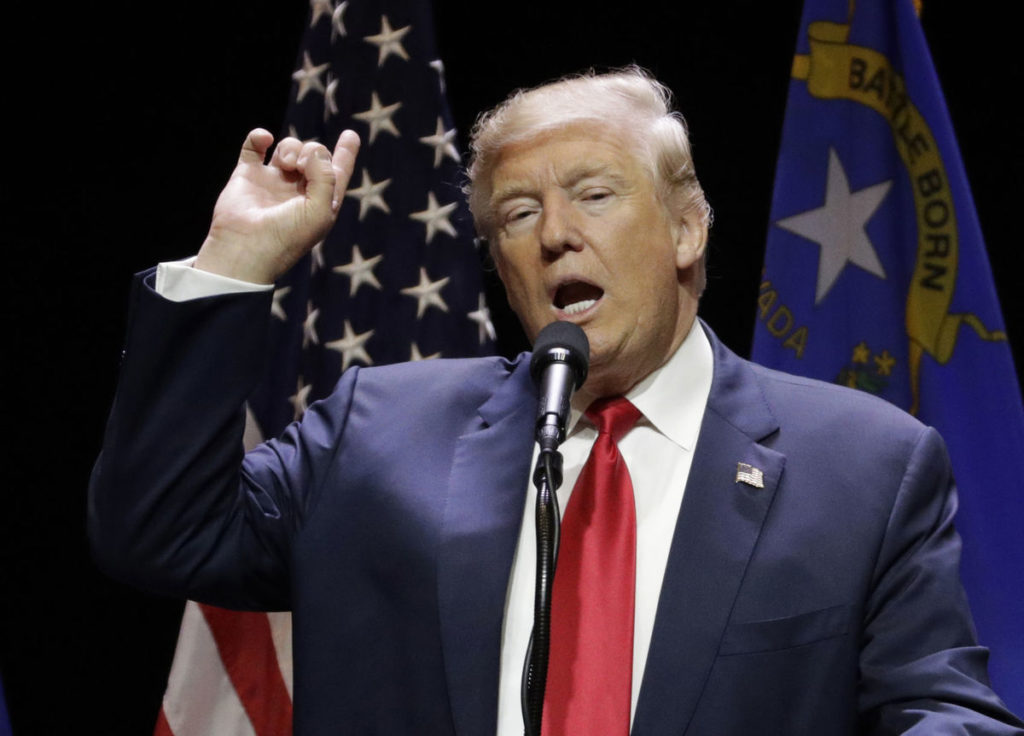
Donald Trump‘s election is bringing to the fore a strain of race-based politics once so far out of the mainstream few had even heard of it. With an ideology that’s a mix of racism, white nationalism and old-fashioned populism, the “alt-right” has burst into the collective consciousness since members showed up at the Republican National Convention to celebrate Trump’s nomination last summer. When one of its leaders, Richard Spencer, gave a speech in Washington last Saturday at an alt-right conference attended by a couple of hundred people, The Atlantic was there with a video camera that captured the Nazi-style salutes of people in his audience. “Hail Trump, hail our people, hail victory!” Spencer said to cheers that were shown in video snippets that have since been viewed hundreds of thousands of times online. What does Spencer mean by “our people”? Whites. Spencer directs the National Policy Institute, which describes itself as “dedicated to the heritage, identity and future of people of European descent in the United States and around the world.” It is Spencer who is widely credited with coming up with the term “alt-right,” or “alternative-right,” about eight years go. While members of the movement are getting more attention than ever, the head of the Anti-Defamation League’s Center on Extremism said Tuesday there is not much new in its message. “The hatred and bigotry that is at the core of alt-right ideology has not changed,” center director Oren Segal said in an interview conducted by private messaging. “What has changed is the name, their packaging and the stated belief that they have a champion in the highest office.” Richard Cohen, president of the Alabama-based Southern Poverty Law Center, an organization that tracks hate groups, said the alt-right is “a rebranding of white nationalism.” Cohen called it “the energy behind the avalanche of racist and anti-Semitic harassment that plagued social media platforms for the entire presidential campaign.” Cohen’s comments came in a statement about Trump’s decision to fill his chief strategist slot with Steve Bannon, who formerly ran Breitbart News, a website popular with members of the alt-right. Indeed, much of the alt-right exists online only, for all practical purposes. While the Ku Klux Klan or neo-Nazis might have public rallies, people associated with the alt-right are more likely to spread their beliefs in online forums or on social media like Twitter. They tend more toward memes than marches; subjects can include criticism of Jews and claims that white Americans are under attack by minority groups. Trump aides and advisers have tried to distance him from the beliefs of the alt-right. In a meeting Tuesday with editors and reporters of The New York Times, Trump said of the alt-right: “I don’t want to energize the group, and I disavow the group.” But members of the alt-right, including Spencer, are vocal in their support of the Republican president-elect. In an interview with The Associated Press in Cleveland, where members of the alt-right obtained credentials to attend the Republican National Convention, Spencer painted himself and Trump as people who think alike. “Do you think it’s a coincidence that everybody like me loves Trump and supports him?” he said. Republished with permission of the Associated Press.
RNC Chairman Reince Priebus chosen as Donald Trump’s WH chief of staff
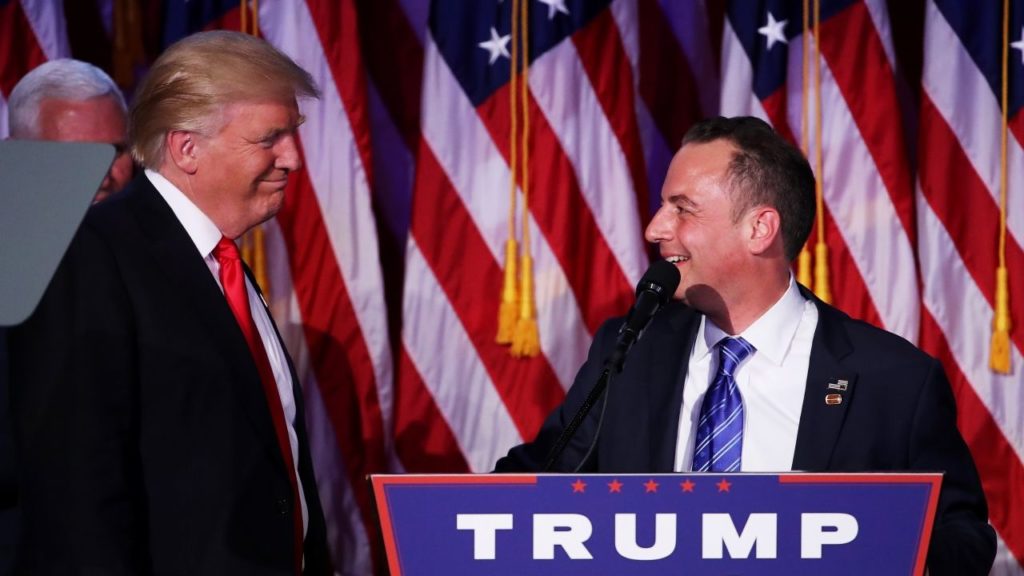
In the year of the outsider, Reince Priebus was the face of the Republican establishment. Yet the Republican National Committee chairman would come to earn the trust and confidence of President-elect Donald Trump, who on Sunday named Priebus as his chief of staff, along with flame-throwing media executive Stephen Bannon as his chief strategist. The position puts Priebus at the power center of the new Trump administration. The 44-year-old Wisconsin political operative will help guard access to the president-elect, guide policy and political decisions, and if past practice holds true, will often be, along with Bannon, the last person Trump consults before making major decisions. Priebus has no governing experience in Washington. Yet his extraordinary ability to build and maintain relationships with his party’s power brokers and grassroots sets him apart from other prospective chiefs of staff. The affable and slow-talking Priebus maintains a particularly close relationship with House Speaker Paul Ryan, who is also from Wisconsin. At the same time, Priebus may have been almost as popular among the Republican National Committee’s 168 members, who represent many different factions of the GOP and come from every state in the nation. Trump’s new chief of staff and the House speaker met in the late 1990s when Priebus was a party activist in Kenosha County, Wisconsin, and Ryan was running for Congress. Priebus eventually became the party chairman of Kenosha County, the First District (the speaker’s district) and then Wisconsin party chairman. He’s been a friend and adviser to Ryan all these many years. Priebus was already the longest serving chairman in party history, having worked in that role since January 2011, but he easily could have been re-elected early next year had he wanted to seek another term. More than anything, he served as the chief fundraiser for the Republican National Committee, a job he did very well. He used the tens of millions of dollars he helped raise to create a nationwide voter outreach operation that fueled Trump’s stunning victory. Still, his status as a party insider caught the attention of Trump supporters such as tea party leader Jenny Beth Martin. She warned on Saturday that, “No Washington insider, regardless of who it is, should serve as President Trump’s chief of staff.” “It’s time to drain the swamp – not promote insiders beholden to the Washington establishment who helped create it,” she said. Priebus’ ability to earn Trump’s trust and confidence ultimately outweighed any political concerns. He was perhaps the only major establishment leader to stand with Trump over the campaign’s final weeks as much of the political world predicted the Republican nominee would lose the election. Priebus became Trump’s regular traveling companion and confidant. He was optimistic until the very end. “I don’t buy this conventional wisdom that somehow or other, things are bad. I think things are going well,” he told The Associated Press a few days before the election. Priebus, a big Green Bay Packers fan, likes to talk sports, he plays the piano and is quick to poke fun at himself. His easygoing personality, self-deprecating humor and lack of knowledge of the legislative process, mark a particularly sharp contrast with President Barack Obama‘s first chief of staff, Rahm Emanuel. He married his high school sweetheart, Sally. They have two school-age children. Priebus “gets along with pretty much everybody,” said Lanhee Chen, a former top adviser to the GOP’s 2012 presidential nominee Mitt Romney. Chen called the pick “a terrific decision.” ”I think it reflects an understanding that, first of all, you have to have someone who understands the politics of Washington,” he said. Priebus has long favored a “big-tent” political philosophy that encourages the GOP to adopt a more welcoming and inclusive tone. Back in December, he condemned Trump’s plan to ban Muslim immigrants in December. “I think it’s the party for everybody. It’s for everyone,” Priebus told the AP days before Trump’s victory. “That the message that we’re trying to get out across the country, which is it doesn’t matter what the color of your skin is, what your faith is, what gender you are, or what age you are. This is a party of freedom, opportunity and equality. That’s what our party is.” Republished with permission of the Associated Press.
Donald Trump, GOP paying consultant dogged by voter fraud charges

Donald Trump‘s campaign and the Republican National Committee have paid at least $1.8 million to a political operative whose roster of companies include several that have been repeatedly investigated for voter registration fraud, even as Trump has complained that the election is rigged against him. Three employees of Strategic Allied Consulting, a firm owned by conservative operative Nathan Sproul, pleaded guilty in Florida four years ago to felony charges related to altering and destroying scores of voter registration forms. There were no formal actions against the firm. Yet recent federal campaign finance reports reviewed by The Associated Press show Sproul is now back on the RNC’s payroll, this time with a firm named Lincoln Strategy Group. That’s a renamed version of his former firm Sproul & Associates, an Arizona-based company that was investigated for alleged voter registration misconduct in Nevada and Oregon. Although Sproul was never charged in the 2012 Florida case, GOP officials and Mitt Romney‘s presidential campaign considered the charges against his employees alone serious enough to fire his company in 2012. The chairman of the RNC said this week he didn’t know Sproul’s firm has been rehired. Neither the Republican Party nor the Trump campaign would discuss the specifics of the work Sproul or the firm is doing and in what states. “We have zero tolerance for any threat to the integrity of elections,” Sean Spicer, spokesman for the Republican National Committee, told the AP in September 2012. “When we were informed of an alleged incident, we immediately cut all ties to the company.” The RNC paid Sproul’s company a total of $1.2 million in October for get-out-the-vote efforts. Records show Donald J. Trump For President Inc. paid another $600,000 to Lincoln Strategy on Oct. 27. RNC Chairman Reince Priebus said he didn’t know his organization was still doing business with Sproul. RNC spokeswoman Lindsay Walters declined to provide specific details about Sproul’s current work for the party. In past years, the RNC’s full spending with Sproul’s firms wasn’t disclosed in campaign finance reports until after the election. “This is a coordinated expenditure with the campaign,” Walters said, referring to the practice of political parties working with campaigns to raise and spend money. “Similar to 2012, coordinated expenditure decisions are joint decisions, the RNC does not have sole decision authority.” Trump campaign spokeswoman Hope Hicks said: “This is a firm that we work with to execute door knocking.” Sproul, 44, said in a statement Friday that his companies had been “cleared of any and all wrongdoing,” and that any past accusations against his firms had been “utterly discredited.” “Lincoln Strategy upholds the strictest anti-fraud standards,” Sproul said. “Because of our strict standards, our company immediately refers people to law enforcement and election officials when there is any indication of improper activity.” In the 2012 Florida case, three people identified by authorities as employees of Strategic Allied Consulting pleaded guilty to forging voter registrations, saying their supervisors had demanded it. But after a two-year investigation, the Florida Department of Law Enforcement said it found no evidence that Sproul’s firm specifically directed its employees to turn in the faked forms. Strategic Allied Consulting reportedly employed about 2,000 people in Florida for the 2012 election. On Sunday, Sproul sought to clarify that those registering voters for his firm were contract workers, rather than his direct employees. “They were all employees of a staffing firm that Strategic contracted with,” Sproul said, though he told AP he could not recall the name of the other company involved. Sproul also claimed his firm reported the suspect workers to law enforcement, though Florida authorities said at the time their investigation was triggered when the fraudulent registrations were flagged by suspicious elections officials in Palm Beach County. A search of online help-wanted ads shows Lincoln Strategy Group is now hiring in North Carolina, Colorado, Missouri and other swing states, offering “Great Pay!” to those available to go door-to-door to canvass voters for conservative causes. “Make America Great Again $20/HR Canvassing,” reads a recent ad posted on Craigslist in Raleigh, North Carolina, offering full-time and part-time jobs through Election Day. A veteran Republican operative from Arizona, Sproul has worked closely with dozens of state and national GOP campaigns, specializing in organizing voter registration drives and outreach efforts targeting evangelical Christians and social conservatives. He told AP his companies have employed more than 10,000 grassroots campaign workers over the last decade. Operating under numerous corporate names, Sproul’s firms also have a history of allegations of voter registration fraud. In a 2012 interview with the Los Angeles Times, Sproul acknowledged he set up multiple companies at the RNC’s request, because the Republican Party wanted to obscure its ties with his firms. Republished with permission of the Associated Press.


